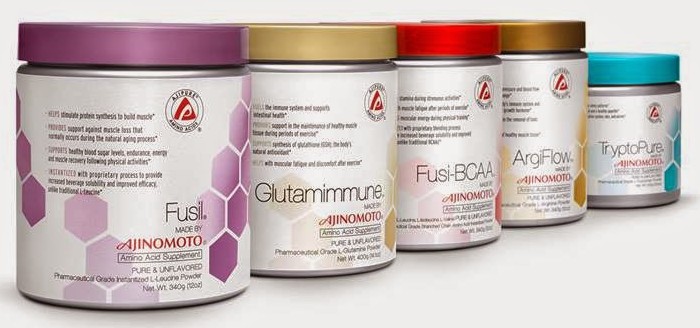Where do Free Form-Amino Acids come from?
04.08.2015Amino Acids; the building blocks of protein! Many of us use or have used amino acid supplements in hopes of limiting muscle breakdown, accelerating recovery, increasing pump, stamina, endurance, overall performance or all of the above. The research supporting the benefits of amino acid supplementation is plentiful. What’s more? Ask around and I’m sure you will find that the number of people who have had positive experiences with amino acid supplementation to be overwhelming. Whether it’s in the lab, on the field or in the gym, there’s no shortage of evidence that amino acid supplementation can improve performance and help us reach our goals faster and more efficiently.
But where do amino acids come from? They come from food, right? That would be correct if we are referring to PEPTIDE BONDED amino acids. For example, some amino acid supplements are derived from sources such as milk, egg and beef that have been processed, dried and made into a powdered form. These amino acids are most often found in tablet form and contain a profile of various amino acids. These products can oftentimes be thought of as mere protein powder(s) that have been combined with additives such as magnesium stearate, cellulose, silicon dioxide and stearic acid amongst others so that it may be compressed into a tablet. Various products offer proteins that are isolated in different ways or enzymatically treated so as to predigest the protein etc etc. Again, these are proteins that contain amino acids as opposed to isolated aminos.
What I’m really here to talk about; my main reason for writing this article is to talk about FREE-FORM amino acids. Anytime you supplement with a product containing singular amino acids in exact amounts you are likely consuming free form amino acids. For example; glutamine powders, creatine, BCAA and EAA supplements among many others, all fall under free form amino acids. MOST of the amino acid products you see in powdered form use free form aminos. Personally, I love free form aminos; they assimilate easily without the body having to work the way it would to digest whole proteins allowing for a direct and acute effect; they work and they work WELL!.
But where do free form aminos come from? One might be under the impression that manufacturers isolate specific amino acids in exact amounts for these products using things like eat or dairy as the source. Such is not the case. Free form amino acids are most often synthesized using hair, feathers, bristles, horns, beaks etc from poultry animals. While I am not privy to the exact process, I am under the impression that the poultry parts undergo hydrolysis where they are exposed to a combination of heat and hydrochloric acid as a means of extracting the amino acids.
Do alternative sources exist? Yes. International ingredient manufacturer Ajinomoto pioneered a patented fermentation process years ago which allowed for the synthesis of amino acids from vegetable based carbohydrates. Their “AjiPure” amino acids have been considered the gold standard among manufacturers for many years because of their high purity and vegetable pedigree. As of late, many other ingredient manufacturers have followed producing vegan/vegetarian free-form amino acids as well.
Are vegan aminos BETTER than their animal derived counterparts? To be honest, I don’t know the science behind it. I have a feeling that many might say that, from a molecular perspective, a gram of leucine is a gram of leucine; and they’re probably correct. However, I suppose that there are a few things to consider. One is purity; is the product pharmaceutical grade and free of unwanted substances and byproducts? The second thing to consider is any personal ideologies you might live by. If you are a strict vegan or if the thought of fueling your training with feathers from Donald Duck’s old wardrobe turns you off , then animal derived amino acids would be out of the question for you. Lastly, it still comes down to the performance of the product. For example, does the product have an off-putting smell or taste? What about solubility/mixability? Does the product sit well with you or does it for some reason cause stomach upset. Based on my personal experience, I have noticed that many animal derived amino acids have an especially unpleasant smell and taste if they are not flavored or mixed with something. Although rare, I have also experienced stomach upset with some animal derived free form aminos; if I had to guess I would think this was a due to a lack of purity. Solubility can vary depending on how well the product is processed; powders that sit on top of solution rather than instantly disperse are very frustrating. Vegan options can be more expensive than the animal derived aminos and that is the reason some brands opt to not include them in their formulations. At the end of the day, I can say that I do prefer vegan aminos and don’t mind investing accordingly. Only you can determine if the extra cost is justified or if the differences between the two are akin to splitting hairs. Hahahahaha!!! Get it?!! HAIRS?!!!!!
























Discuss on our forums
Continue the discussion on our forum →